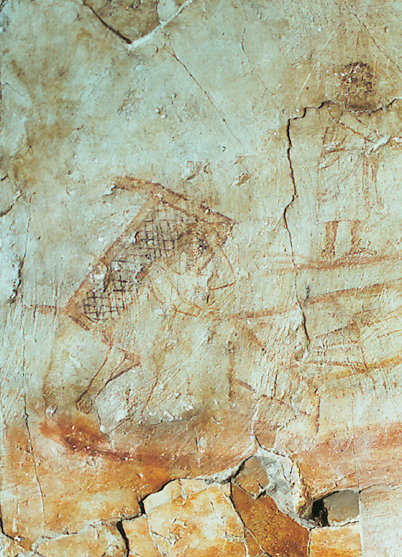Understanding Western Society
Printed Page 166
The Life and Teachings of Jesus
Into this climate of Messianic hope and Roman religious blending came Jesus of Nazareth (ca. 3 B.C.E.–ca. 29 C.E.). According to Christian scripture, he was born to deeply religious Jewish parents and raised in Galilee, the stronghold of the Zealots and a trading center where Greeks and Romans interacted with Jews. His ministry began when he was about thirty, and he taught by preaching and telling stories.
Like Socrates, Jesus left no writings. Accounts of his sayings and teachings first circulated orally among his followers and were later written down. The principal evidence for his life and deeds are the four Gospels of the Bible (Matthew, Mark, Luke, John), books that are part of what Christians later termed the New Testament. These Gospels — the name means “good news” — are records of Jesus’s teachings, written to build a community of faith sometime in the late first century. The Gospels were among the most widely copied and circulated early accounts of Jesus’s life, and by the fourth century, officials in the Christian Church decided that they, along with other types of writing such as letters and prophecies, would form Christian scripture.
The Gospels include certain details of Jesus’s life, but they were not meant to be biographies. Their authors had probably heard many different people talk about what Jesus said and did, and there are discrepancies among the four accounts. These differences indicate that early followers had a diversity of beliefs about Jesus’s nature and purpose.

However, almost all the early sources agree on certain aspects of Jesus’s teachings: He preached of a heavenly kingdom of eternal happiness in a life after death and of the importance of devotion to God and love of others. His teachings were based on Hebrew scripture and reflected a conception of God and morality that came from Jewish tradition. The Greek translation of the Hebrew word Messiah is Christos, the origin of the English word Christ. Was Jesus the Messiah, the Christ? A small band of followers thought so, and Jesus claimed that he was. Yet Jesus had his own conception of the Messiah. He would establish a spiritual kingdom, not an earthly one.
The Roman official Pontius Pilate, who had authority over much of Judaea, knew little about Jesus’s teachings. Like all Roman officials, he was concerned with maintaining peace and order, which was a difficult task in restive Judaea. According to the New Testament, crowds followed Jesus into Jerusalem at the time of Passover, a highly emotional time in the Jewish year that marked the Jewish people’s departure from Egypt under the leadership of Moses (see "The Jewish Religion" in Chapter 2). The prospect that these crowds would spark violence no doubt alarmed Pilate. Some Jews believed that Jesus was the long-